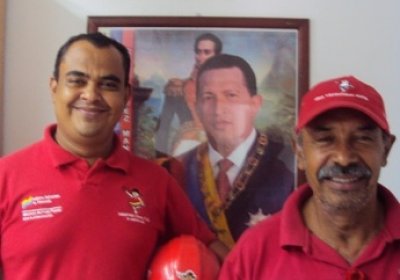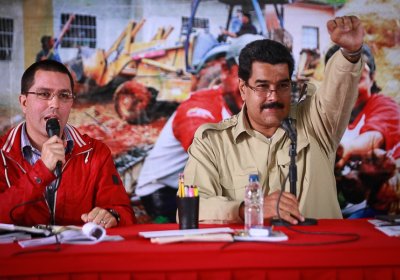In a national census held over September 7 and 8, 1150 communes registered in a national census, exceeding expectations.
The communes are forms of “popular power” in Venezuela that unite representatives of local communal councils across a regional area. Community councils in Venezuela are grassroots bodies where local residents manage public funds and undertake projects promoting community development.
Communes, meanwhile, are formed by groups of community councils, and can take on larger scale projects and public works.
Ewan Robertson
Venezuela has agreed to sell oil to the Palestinian Authority (PA) at a “fair price” as part of new energy agreements with the Middle Eastern government.
The deals, made during a meeting between Venezuelan foreign minister Elias Jaua and his PA counterpart Riyah al-Malki in Caracas on August 24, include the training of Palestinians in the handling and distribution of oil.
Jaua referred to the deal as “an agreement of cooperation and solidarity … the sale of fuel at a fair price”.
Workers at Diana Industries have welcomed the appointment of a new company manager, claiming victory in their fight to prevent the “imposition” of businessperson David Mendoza as head of the worker-run company.
Nationalised in 2008, production at Diana Industries is organised by workers through assemblies and a Socialist Workers’ Council. The company produces cooking oil, margarine, soap and other products, 80% of which are destined for state-run distribution networks.
Venezuelan President Nicolas Maduro called on August 15 for his government to give greater support to the construction of communes in the country. He proposed several initiatives by which this could be done.
Communes have their origin in Venezuela's communal councils, which are grassroots bodies made up of members of the local community. These self-managed bodies receive public funds to undertake community projects and small-scale public works.
Activists from across the Venezuelan labour movement met last weekend for the country’s first ever Workers’ Congress, where workers discussed workplace democracy and the construction of socialism.
The congress, billed “I Workers’ Congress: Balance and Challenges of Worker Control and Workers’ Councils for the Construction of Socialism”, was organised by the National Worker Control Movement and saw the participation of over fifty groups from factories across the country.
The Food and Agriculture Organisation of the United Nations (FAO) recognised Venezuela on June 16 as one of 18 countries that had achieved exceptional progress toward reducing the prevalence of malnutrition.
Measuring progress from 1990-1992 until 2010-2012, the FAO determined that 20 countries had cut the proportion of hungry people by half, satisfying the first of the United Nations’ Millennium Development Goals (MDG) originally set for 2015.
Following the implementation of measures to tackle shortages in some basic food and household items, both private Venezuelan media and the government report that the level of shortages is now decreasing.
Shortages hit their highest level in five years in April, provoking a flurry of international media criticism of the government and affecting the popularity of president Nicolas Maduro in the lead-up to the 14 April election.
Venezuela and Bolivia have agreed to raise cooperation to a “higher level” following Venezuelan president Nicolas Maduro’s visit to Bolivia on May 25.
During bilateral meetings held in Cochabamba, Maduro and Bolivian President Evo Morales signed key accords in food production, industrial development and communications.
“It’s necessary to place the strategic map of bilateral cooperation at a higher level, including a more organised one,” said Maduro.
Venezuela has abolished entrance visas for Palestinian visitors among a set of new agreements with the Middle Eastern country.
Venezuela became the first country to abolish visas for Palestinians carrying civil or diplomatic passports as part of talks in early December in Caracas between representatives of the two countries. Venezuela also committed itself to build a new hospital in Palestinian territory and made new agreements in the areas of health, education and tourism.
In May 2008, Venezuelan President Hugo Chavez endorsed Plan Socialist Guyana (PGS), drawn up by elected representatives from workers in Venezuela's heavy industry sector in Guyana.
This plan calls for the introduction of workers' control across the state-owned industries grouped in the Guyana Venezuela Corporation(CGV), as well as a shift away from producing raw materials for multinationals towards Venezuela's development needs and taking the needs of communities and the environment into consideration.
The Union of South American States (UNASUR) threw its support behind Ecuador in its diplomatic dispute with Britain over Wikileaks founder Julian Assange, after a meeting of UNASUR foreign ministers yesterday in Guayaquil, Ecuador.
UNASUR unites 12 South American nations (Argentina, Bolivia, Brazil, Chile, Colombia, Guyana, Ecuador, Uruguay, Paraguay, Peru, Suriname and Venezuela).
On August 16, Ecuador granted Assange diplomatic asylum in its London embassy due to fears his human rights could be violated if extradited to Sweden to face sexual assault charges.
Venezuela and the Bolivarian Alliance of the Americas (ALBA) have backed Ecuador against “threats” from Britain, after Ecuador granted WikiLeaks founder Julian Assange diplomatic asylum in the Ecuadorian embassy in London on August 16.
ALBA is an anti-imperialist bloc of eight nations that includes Ecuador, Venezuela, Cuba and Bolivia.
Swedish authorities want to extradite Assange from Britain to investigate allegations against him of sexual assault.
- Previous page
- Page 3
- Next page




